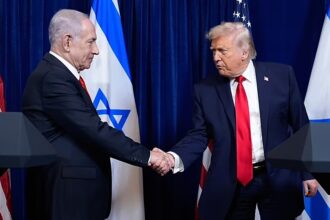By Noah Rayman
CAIRO: A restless nation is recovering from a successful popular movement to throw out the system and establish the beginnings of what everyone hopes to be a prosperous democracy. Still lingering are the memories of horrific police violence against the youthful protesters, but the nation is determined to move forward.
This is South Africa in 1995, following the eradication of Apartheid and the recent election of national icon Nelson Mandela as president. In that year, the government established the Truth and Reconciliation Commission to publicly record accounts of victims and perpetuators alike of some of the most egregious human rights violations that had occurred under the previous regime. To be chaired by Archbishop Desmond Tutu, the Commission was to seek truth and closure for victims. In some cases, the Commission was authorized to grant amnesty.
Bart Burghgraef, a Dutchman, was living in South Africa at the time. Recently, as project manager of the Dutch-Egyptian NGO MasterPeace, Burghgraef asked himself whether lessons from South Africa’s trying experience with reconciliation could be applied to a post-Mubarak Egypt. The question was too large to tackle on his own, so he turned to others.
On Monday, MasterPeace hosted what it labeled a “Cairo Conversation” at El Sawy Culture Wheel in Zamalek. The evening’s event was titled “Truth and Reconciliation: Could Egyptian society benefit from South Africa’s experience towards national unity?”
“Healing and reconciliation, is that a concept that can be rooted in the hearts and minds of people in order to move forward?” asks Burghgraef.
South African Ambassador to Egypt Noluthando Mayende-Sibiya opened the evening by guiding the audience of 100 Egyptians, expats, and passersby through the tense period in the nation’s history as it discarded the racist policies of the old regime.
“The people of South Africa rose and fought against the system,” she recounted. “Young as we are, we are very proud of our democratic era.”
The ambassador focused on the unique contributions of the nation’s leaders through the period of rebuilding. “They had a vision that is amazing even today,” she said. “We may not have done it without a Nelson Mandela and other great leaders of the time.”
She says she learned to look forward and not to the past from the likes of Mandela and Tutu. Quoting Tutu, who chaired the TRC for two years, she said, “To forgive is not just to be altruistic. It is the best form of self-interest … What dehumanizes you, inexorably dehumanizes me.”
A lively discussion arose among the audience—even drawing the evening’s translator out of his booth to speak his mind—after Burghgraef asked attendees to break into groups and respond to the question at hand.
Respondents disagreed about how reconciliation applied to contemporary Egypt, or whether it was necessary at all.
“The first thing to have in this sensitive state is justice,” one young woman said after the groups came together to explain their individual conversations. “Without justice I cannot reconcile.”
But others said reconciliation — between religions, with the police, and even with some members of the previous regime — would be necessary for the nation to move forward together.
Some saw promise in South Africa’s TRC, which has since been used as a model in 19 post-conflict nations.
“Are we going to use the same methods to replying to the perpetrators of the violence,” said one attendee. “Do we really want to respond in revenge?”
The Cairo Conversation was a pilot for the recently established MasterPeace organization, which officially launches in September. Calling itself “the most heartwarming peace project ever,” MasterPeace encourages local conversation and participation in conflict-resolution efforts. It hopes to engage some 20 million people around the world in the next three years.
Following the ambassador’s account, Culture Wheel founder and former minister of culture Mohamed El-Sawy reflected on what reconciliation could mean for Egypt.
He said the sentiment of forgiveness evident in post-apartheid South Africa would be difficult for him to undertake. But South Africa’s experience should nonetheless serve as a strong reference for Egyptians today, he said.
“It gives us in Egypt a big hope that we as a nation can overcome these tough days and really celebrate the achievements and the blood that was poured,” he said.
“To make their blood have the deserved value, we should really take this lesson as a guideline for the near future.”
Š Θ
Θ
#

#
The Cairo Conversation was a pilot for the recently established MasterPeace organization.
#


